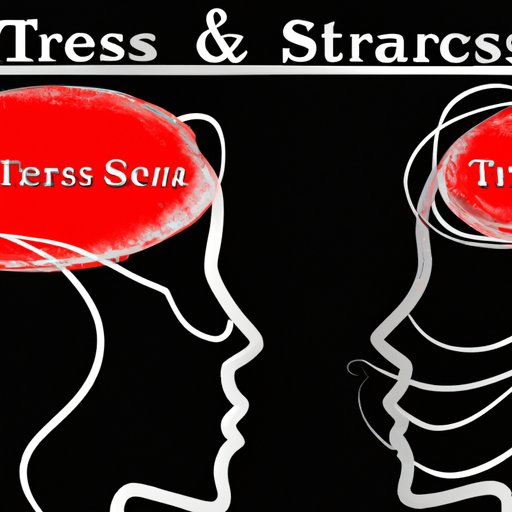
Does Stress Cause Headaches? Exploring the Link Between Stress and Headaches
Headaches are a common ailment experienced by many people. While they can be caused by a variety of factors, stress is one of the most common triggers. Stress-induced headaches can have a significant impact on an individual’s quality of life, making it important to understand the relationship between stress and headaches.
The Science Behind Stress and Headaches: What You Need to Know
Stress is a natural physiological response that occurs when the body perceives a threat. This threat can be physical, emotional, or psychological. The body responds to stress by releasing stress hormones, such as cortisol and adrenaline, which cause a wide range of physiological changes in the body.
Stress can cause headaches through a number of mechanisms. For example, stress can cause muscle tension in the neck and scalp, which can trigger tension headaches. Stress can also cause changes in blood flow to the brain, which can lead to migraines. Additionally, stress can make existing headaches worse.
The most common types of headaches associated with stress are tension headaches and migraines. Tension headaches are often described as a dull, aching pain that feels like a band around the head. Migraines, on the other hand, are characterized by a pulsing or throbbing pain on one or both sides of the head. Migraines often come with other symptoms, such as sensitivity to light and sound, nausea, and vomiting.
Exploring the Link Between Stress and Migraines
Migraines are a type of headache that is closely linked to stress. Migraines are defined by the International Headache Society as a recurrent headache that lasts between 4 and 72 hours, characterized by pulsating pain on one or both sides of the head, sensitivity to light and sound, and other symptoms such as nausea and vomiting.
Research findings suggest that stress can play a role in triggering migraine attacks. Stressful events, such as work-related stress, relationship stress, or traumatic events, have been found to increase the likelihood of migraines. Additionally, changes in stress levels, such as going on vacation or starting a new job, can trigger migraine attacks.
It’s important to note that not all headaches are migraines. While stress can trigger migraines, it doesn’t necessarily cause all types of headaches. It’s important to differentiate between migraines and other types of headaches, such as tension headaches or cluster headaches, to ensure that proper treatment is received.
The Impact of Stress on the Brain and How It Affects Pain Perception
Stress is known to affect the brain’s pain processing pathways. During stress, the body releases stress hormones, which can increase the sensitivity of nerve cells in the brain that transmit pain signals. This can make existing headaches worse or increase the frequency of headaches.
Two possible mechanisms underlying stress-induced changes in pain perception are stress-induced inflammation and stress-induced neural plasticity. Stress-induced inflammation refers to the body’s response to stress, resulting in the release of pro-inflammatory cytokines, which can cause pain and inflammation in various parts of the body. Stress-induced neural plasticity refers to the brain’s ability to change and adapt in response to stress. This can lead to changes in the brain’s pain processing pathways, making it easier for pain sensations to occur.

Stress and Tension Headaches: Understanding the Connection
Tension headaches are the most common type of headache experienced by adults. They are often caused by muscle tension in the neck, scalp, and jaw. Stress is a common cause of muscle tension, making it a leading cause of tension headaches. Common symptoms of tension headaches include a dull, aching pain that feels like a band around the head, tenderness in the scalp and neck muscles, and sensitivity to light and sound.
To manage tension headaches caused by stress, relaxation techniques can be useful, such as deep breathing, meditation, and yoga. It’s also important to manage stress through therapies such as cognitive-behavioral therapy (CBT) and other stress management strategies. Additionally, it’s important to address any underlying postural problems or muscle imbalances that may be causing muscle tension and contributing to tension headaches.
5 Effective Ways to Manage Stress-Induced Headaches
Thankfully, there are many approaches to treating stress-induced headaches that don’t require medication. Here are five effective strategies to manage stress-induced headaches:
- Exercise regularly: Regular physical activity has been found to be an effective way to manage stress and reduce the frequency and severity of headaches.
- Practice relaxation techniques: Techniques such as deep breathing, meditation, and yoga can help reduce stress and relieve tension in the muscles, reducing the frequency and severity of headaches.
- Get enough sleep: Getting enough sleep is essential for managing stress and reducing the frequency and severity of headaches.
- Maintain a healthy diet: Eating a well-balanced diet can help reduce stress and inflammation, which can help prevent headaches.
- Seek medical attention when necessary: If headaches are interfering with daily life and are not responding to self-care measures, it may be necessary to seek medical attention for diagnosis and treatment.
How to Recognize the Signs of Stress Headaches and Prevent Them
Recognizing the signs and symptoms of stress headaches can be helpful in identifying triggers and preventing future headaches from occurring. Common symptoms of stress headaches include a dull, aching pain on both sides of the head, tenderness in the scalp and neck muscles, and sensitivity to light and sound.
To prevent stress headaches, it’s important to take proactive measures to reduce stress, such as practicing stress-management techniques, exercising regularly, and getting enough sleep. Additionally, it’s important to avoid triggers that can cause headaches, such as certain foods, caffeine, and alcohol.
Coping with Chronic Headaches Caused by Stress: Tips and Strategies
Chronic headaches caused by stress can be significantly disruptive to quality of life. Coping strategies for people with chronic stress headaches may include both medication and non-medication approaches. It’s important to work with a healthcare professional to identify the most appropriate treatment plan.
Some non-medication approaches to managing chronic stress headaches include relaxation techniques, such as deep breathing, meditation, and yoga, exercise, and stress-management strategies. Medication approaches may include preventive medications, such as antidepressants, or acute medications, such as abortive medications to stop headaches once they’ve started.
It’s important to note that dealing with chronic headaches can be a long-term process, and it’s essential to seek support and medical attention if headaches are affecting quality of life.
Conclusion
Stress can be a significant trigger of headaches, making it important to recognize and manage stress-induced headaches. Migraines and tension headaches are closely linked to stress, while other types of headaches can have other underlying causes. Implementing stress-management techniques, such as exercising regularly, practicing relaxation techniques, and getting enough sleep, can be effective ways to manage stress-induced headaches. Additionally, it’s important to seek medical attention if headaches are interfering with daily life.




